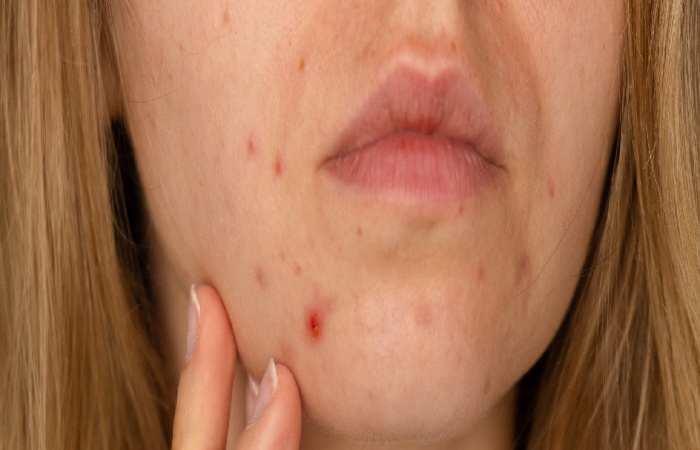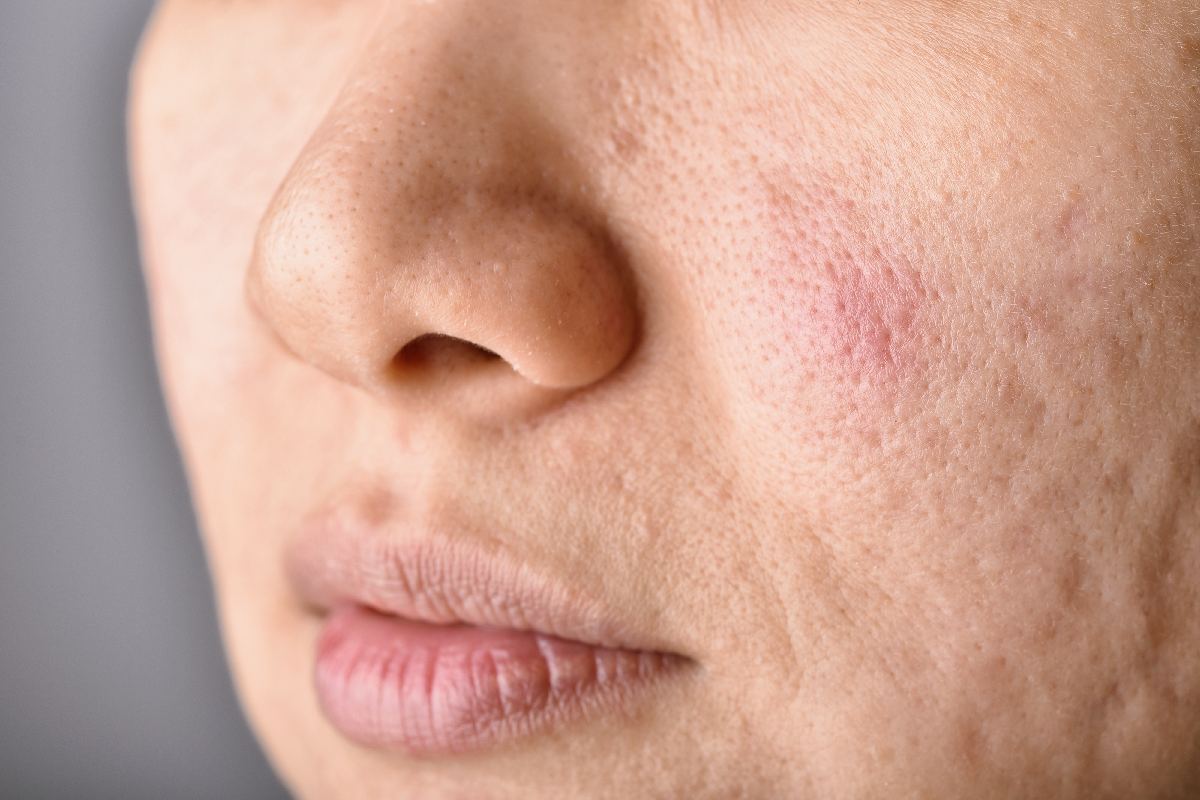Acne scars, a prevalent issue for countless people, often emerge following intense acne episodes, extending far beyond a mere cosmetic problem. These scars represent the culmination of intricate biological reactions triggered by the body’s response to skin damage caused by acne. This process involves various skin layers and cellular mechanisms, including inflammation, collagen disruption, and tissue remodeling. Delving into
the scientific intricacies of these scars is crucial, as it unravels the pathophysiology of scar formation and paves the way for developing targeted treatments. By dissecting the factors that contribute to scar development and the body’s healing capabilities, we can enhance our strategies for both treating existing scars and preventing new ones from forming, thereby addressing a significant dermatological concern.
Table of Contents
The Formation Of Acne Scars

When acne develops, it often causes inflammation deep within the skin. This inflammation can damage the collagen fibers that provide structure and support. In response, the body initiates a healing process, attempting to repair this damage. However, the body’s repair mechanisms are not always perfect. Sometimes, it produces too little or too much collagen, leading to the formation of scars.
Atrophic scars, characterized by a loss of tissue, are common when there is a deficit in collagen production. Conversely, hypertrophic scars or keloids, marked by an overproduction of collagen, create raised scar tissue. The type of scar that forms largely depends on genetic factors and the severity of the acne.
Understanding The Healing Process
The journey of healing acne scars is rooted in the body’s intricate response to injury. When acne damages the skin, the immune system initially reacts by deploying white blood cells and releasing inflammatory molecules to the site. Although a natural defense mechanism, this response can sometimes overreact, leading to collateral damage. The inflammation often goes beyond targeting just the acne-causing bacteria or damaged cells, affecting surrounding healthy skin cells. This unintentional harm to healthy tissue can intensify the severity of scars, making them more pronounced and harder to heal.
As the initial inflammatory phase subsides, the body enters the crucial phase of tissue repair, where fibroblasts come into play. These cells, vital for wound healing, begin synthesizing collagen, the protein responsible for skin strength and elasticity. The balance of collagen breakdown and synthesis at this stage is pivotal. If the body produces too much collagen, it results in raised, hypertrophic scars or keloids. Conversely, insufficient collagen leads to atrophic scars, which appear as depressions in the skin. The final appearance and texture of acne scars are thus determined by this delicate balance in the skin’s healing process.
Effective Treatments For Acne Scars
Treating acne scars effectively requires a multifaceted approach, as there is no one-size-fits-all solution. Topical treatments, such as retinoids, are often the first line of defense. These agents promote skin cell turnover, helping to reduce the visibility of scars over time. However, more invasive procedures are considered for more pronounced or deep scars. Techniques like laser therapy and microdermabrasion work by removing the upper layers of the skin, encouraging new, healthy skin growth.
There has been notable progress in acne scar treatment Singapore, offering various advanced options. Chemical peels, for instance, use a solution to exfoliate the top layers of skin, making way for new, smoother skin. Dermal fillers can be used to fill in atrophic scars, while steroid injections are effective for reducing raised scars. The choice of treatment depends greatly on the type, severity, and location of the acne scars, the individual’s skin type, and overall health.
Preventing Acne And Its Scars
Preventing acne and its subsequent scarring is fundamental and often more manageable than treating it post-formation. Key to this prevention is the effective management of acne itself. Regular cleansing with suitable products helps to keep pores clear of the oils and debris that can trigger acne. Additionally, using non-comedogenic skincare products ensures that the skin is not unduly burdened with ingredients that clog pores. Early treatment of acne outbreaks is also vital, as it reduces the chances of severe acne that is more likely to leave scars.
Another crucial aspect of prevention is resisting the urge to pick or squeeze acne lesions. This common habit can significantly worsen scarring, often leading to deeper and more severe skin damage. Educating individuals about the risks associated with picking at acne and providing them with effective acne management strategies is essential in reducing the prevalence and severity of acne scars.
Lifestyle And Acne Scars
Lifestyle choices play a significant role in both the development and the healing of acne scars. A diet rich in antioxidants and nutrients supports skin health, promoting its natural repair mechanisms. Adequate hydration is also key, as it ensures the skin remains supple and better recovers from scarring. On the other hand, certain foods, particularly those high in sugar and dairy, might exacerbate acne in some individuals, leading to more severe scarring.
Stress management is another crucial aspect, as stress can trigger hormonal imbalances that exacerbate acne. Engaging in regular physical activity, practicing relaxation techniques, and ensuring adequate sleep can help manage stress levels. Additionally, protecting the skin from excessive sun exposure is critical. Ultraviolet (UV) rays from the sun can darken scars, make them more noticeable, and impede the healing process. Using a broad-spectrum sunscreen with an appropriate SPF is a simple yet effective way to protect scarring from worsening due to sun exposure.
Home Remedies And Natural Treatments
While the efficacy of medical treatments for acne scars is widely recognized, many individuals turn to home remedies and natural treatments. These methods, which are often passed down through generations, include ingredients like aloe vera, lemon juice, and honey, known for their soothing and healing properties. Aloe vera, for instance, is celebrated for its anti-inflammatory and regenerative qualities, which can help heal scars. Lemon juice, with its natural acidity, is believed to lighten scars, while honey is known for its antibacterial and wound-healing properties.
However, it’s crucial to approach these natural remedies with caution. What works for one person may not be suitable for another, especially considering different skin types and sensitivities. For example, lemon juice can be overly harsh for sensitive skin, and some natural remedies can cause allergic reactions or irritate the skin, potentially worsening the condition. It’s advisable to conduct a patch test or consult a dermatologist before trying out these remedies, especially for sensitive or allergy-prone skin.
The Role Of Genetics In Scar Formation
Genetics significantly influence the skin’s response to acne and its propensity to scar. Individual genetic makeup determines various factors like skin type, collagen production, and immune response, all of which affect how the skin heals after acne. Some people are genetically predisposed to more collagen in their skin, which can lead to raised scars. In contrast, others might have less, resulting in atrophic scars.
Understanding one’s genetic predisposition can be immensely helpful in customizing treatment and preventive strategies for acne and its scars. For instance, individuals prone to keloid formation might be advised to avoid certain types of skin trauma or invasive acne treatments. On the other hand, those with a tendency towards atrophic scarring might focus more on collagen-stimulating treatments. Genetic testing and consultations with dermatologists can provide valuable insights into the most effective strategies for managing and preventing acne scars based on individual genetic profiles.
Innovations In Scar Treatment
The field of acne scar treatment has witnessed remarkable innovations, offering new hope to those dealing with persistent scars. Among these advancements is fractional laser therapy, a cutting-edge technique that creates microthermal zones in the skin. This stimulates the skin’s natural healing process, promoting the production of new collagen and resulting in smoother, more even skin texture. This method is particularly effective for treating atrophic scars, as it helps to replenish the lost collagen and restore the skin’s surface.
Platelet-rich plasma (PRP) treatments have also gained popularity as an innovative approach to scar treatment. In this procedure, a patient’s own blood is processed to concentrate the platelets, which are then re-injected into the scarred area. The growth factors present in platelets accelerate the healing process, improving the appearance of scars. These treatments offer a more targeted and effective approach to scar reduction, especially for those without significant improvements with traditional methods.
The Psychological Impact Of Acne Scars
The psychological impact of acne scars extends far beyond their physical appearance. These scars can profoundly affect an individual’s self-esteem and confidence, often leading to social anxiety and withdrawal. The visibility of acne scars, especially on the face, can make people overly self-conscious about their appearance, impacting their daily interactions and social life.
Recognizing and addressing the emotional and psychological aspects of living with acne scars is as important as treating the physical scars. Access to effective treatment is crucial in improving one’s mental well-being. It can help alleviate the distress associated with these scars, leading to improved self-image and confidence. Additionally, support from healthcare professionals, counselors, or support groups can provide a safe space for individuals to share their experiences and cope with the emotional challenges posed by acne. Effective treatment combined with emotional support can significantly enhance the quality of life for those affected by acne.
Conclusion
Acne scars are more than skin deep, involving intricate biological processes and emotional impacts. Understanding the science behind these scars is crucial for effective treatment and prevention. With various treatments available, from advanced medical procedures to natural home remedies, individuals have options to manage and reduce the appearance of these scars. Taking a holistic approach that includes lifestyle changes and proper skin care can significantly improve skin health and overall well-being.

